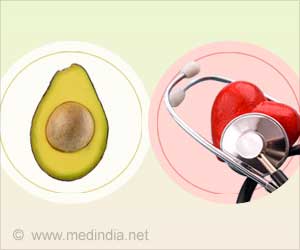Avocados include a variety of nutrients and phytochemicals that may offer health benefits such as improving cholesterol and vascular health.
- Avocado consumption can fit into a variety of healthy eating plans in the framework of a healthy diet
- The typical avocado consumption is half a fruit, resulting in a nutrient and phytochemical-rich diet
- Avocados can have a positive heart-healthy effect on blood lipids profiles
Nutrient Content of Avocado
It includes the following:| Nutrients | value |
| dietary fiber | 4.6g |
| total sugar | 0.2 g |
| potassium | 345 mg |
| sodium | 5.5 mg |
| magnesium | 19.5 mg |
| vitamin A | 43 mcg |
| vitamin C | 6.0 mg |
| vitamin E | 1.3 mg |
| vitamin K1 | 4 mcg |
| folate | 60 mg |
| vitamin B-6 | 0.2 mg |
| niacin | 1.3 mg |
| pantothenic acid | 1.0 mg |
| riboflavin | 0.1 mg |
| choline | 10 mg |
| lutein/zeaxanthin | 185 mcg |
| phytosterols | 57 mg |
| high-monounsaturated fatty acids | 6.7 g |
Health Benefits of Avocado oil
Avocado oil contains 71% monounsaturated fatty acids (MUFA), 13% polyunsaturated fatty acids (PUFA), and 16% saturated fatty acids (SFA), which promotes healthy blood lipid profiles and increases the bioavailability of fat-soluble vitamins and phytochemicals from avocados and other low-fat fruits and vegetables consumed with avocados.Health Benefits of Avocado
Eight preliminary clinical trials demonstrate that eating avocados improves cardiovascular health. According to preliminary research, avocados may help with weight management and healthy aging.Avocado Helps with Weight Loss
Researchers looked at the effect of eating one and a half avocados (200 g) as part of a weight loss diet plan. In this study, 61 healthy free-living, overweight, and obese adults were randomly assigned to either a group that consumed 200 g/d of avocados (30.6 g fat) substituted for 30 g of mixed fats such as margarine and oil, or a control group that did not consume avocados for 6 weeks (1✔ ✔Trusted SourceSubstitution of high monounsaturated fatty acid avocado for mixed dietary fats during an energy-restricted diet: effects on weight loss, serum lipids, fibrinogen, and vascular function
Go to source). To confirm that avocado can fit within a weight loss diet plan, both groups dropped identical amounts of weight, body mass index (BMI), and percentage of body fat (p 0.001). A randomized single-blinded, crossover postprandial trial of 26 healthy overweight individuals found that eating half an avocado at lunch reduced self-reported hunger and desire to eat while increasing satiation (p 0.002). Furthermore, numerous preliminary studies indicate that MUFA-rich diets may help protect against belly fat build-up and diabetes health consequences (2✔ ✔Trusted Source
Differential Effects of Two Isoenergetic Meals Rich in Saturated or Monounsaturated Fat on Endothelial Function in Subjects With Type 2 Diabetes
Go to source).
Avocado Promotes Healthy Aging
Several clinical investigations suggest that xanthophylls, such as those present in avocados, may provide antioxidant and DNA-protecting actions, as well as potential healthy aging benefits. One study included 82 male airline pilots and regular flyers who were exposed to high levels of cosmic ionizing radiation, which is known to damage DNA and potentially accelerate the aging process (3✔ ✔Trusted SourceHigh dietary antioxidant intakes are associated with decreased chromosome translocation frequency in airline pilots
Go to source). There was a substantial and inverse relationship between fruit and vegetable intake of vitamin C, beta-carotene, -cryptoxanthin, and lutein-zeaxanthin and the incidence of chromosome translocation, a biomarker of cumulative DNA damage (p 0.05). Another study found that lipid peroxidation (8-epiprostaglandin F2a) was inversely associated with plasma xanthophyll levels (4✔ ✔Trusted Source
Plasma xanthophyll carotenoids correlate inversely with indices of oxidative DNA damage and lipid peroxidation
Go to source). In contrast to beta-carotene, inverse associations were identified between lutein and oxidative DNA damage as determined by the comet assay in other investigations (5✔ ✔Trusted Source
Plasma Carotenoids and Biomarkers of Oxidative Stress in Patients with prior Head and Neck Cancer
Go to source). According to NHANES data, xanthophyll consumption decreases with age (6✔ ✔Trusted Source
Intake of lutein and zeaxanthin differ with age, sex, and ethnicity
Go to source).
References:
- Substitution of high monounsaturated fatty acid avocado for mixed dietary fats during an energy-restricted diet: effects on weight loss, serum lipids, fibrinogen, and vascular function - (https://pubmed.ncbi.nlm.nih.gov/15661480/)
- Differential Effects of Two Isoenergetic Meals Rich in Saturated or Monounsaturated Fat on Endothelial Function in Subjects With Type 2 Diabetes - (https://www.ncbi.nlm.nih.gov/pmc/articles/PMC2584179/)
- High dietary antioxidant intakes are associated with decreased chromosome translocation frequency in airline pilots - (https://www.ncbi.nlm.nih.gov/pmc/articles/PMC2762162/)
- Plasma xanthophyll carotenoids correlate inversely with indices of oxidative DNA damage and lipid peroxidation - (https://pubmed.ncbi.nlm.nih.gov/10794487/)
- Plasma Carotenoids and Biomarkers of Oxidative Stress in Patients with prior Head and Neck Cancer - (https://www.ncbi.nlm.nih.gov/pmc/articles/PMC2700759/)
- Intake of lutein and zeaxanthin differ with age, sex, and ethnicity - (https://pubmed.ncbi.nlm.nih.gov/20800129/)
Source-Medindia
















